US universities gripped by identity crisis
- Published
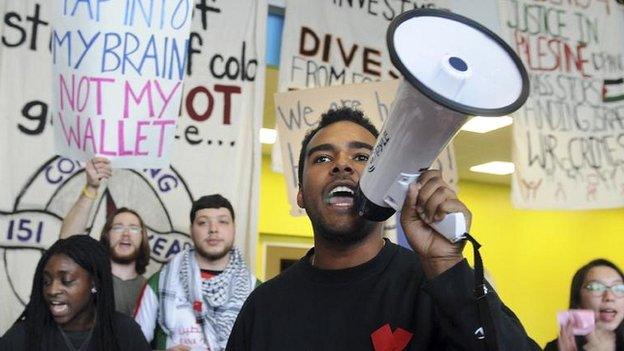
Students at University of Massachusetts Amherst campaign over racial inclusion and student debt
Universities across the United States are caught up in a wave of protests swirling around issues of race, identity and how institutions should respond to their history.
It's raised far-reaching questions about campus culture and the boundaries of free speech.
Much of this battle has been fought out in symbols and arguments over language.
In Harvard, there are calls to ditch "master" from the academic title of "house masters", the heads of residential houses, because of the word's associations with slavery.
The title has more to do with the British education system, with its "school masters" and "house masters". But in the US context, where "master" has different historical echoes, the word itself has become toxic.
And reflecting the mood on campus, this argument has been accepted by the Harvard house masters themselves, who say they are now looking for a different title.
They say the use of the word "master" causes discomfort and creates images of "human subjugation".
Slavery links
Harvard's Law School has been embroiled in a row over its crest, which displays the coat of arms of the Royall family. This is a link to an 18th Century college donor, Isaac Royall, who as well as establishing the college's first professorship in law, was a particularly brutal slaveholder.
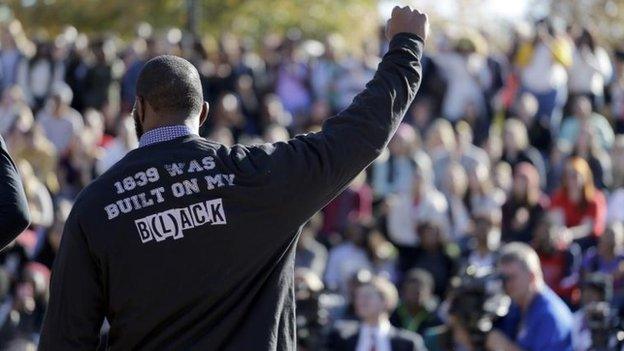
A student protest at the University of Missouri saw the removal of the president
This has been the law school's official seal since the 1930s, but now this winter, following accusations that this was a racist emblem, a committee has been set up to reconsider its use.
In Princeton, the dispute has focused on a school named after Woodrow Wilson. The former US president stands accused of holding deeply entrenched racist views, and protesters from the Black Justice League want the building renamed.
In Yale, there has been a campaign to rename Calhoun College, to remove links with John Calhoun, a 19th Century advocate of slavery.

More stories from the BBC's Knowledge economy series, external looking at education from a global perspective and how to get in touch

The thread linking the protests is the suggestion that racism is not a thing of the past but remains as an unresolved question on campus.
There is a website, the Demands, external, listing the grievances in more than 70 universities where students have "risen up" against such prejudice.
'Tribal identity'
But why are so many protests hitting universities now?
Carol Christ, director of the Center for Studies in Higher Education, University of California, Berkeley, says that "symbolic fights are always about real and current political issues" and in the US, the issue of race is never far from the surface.
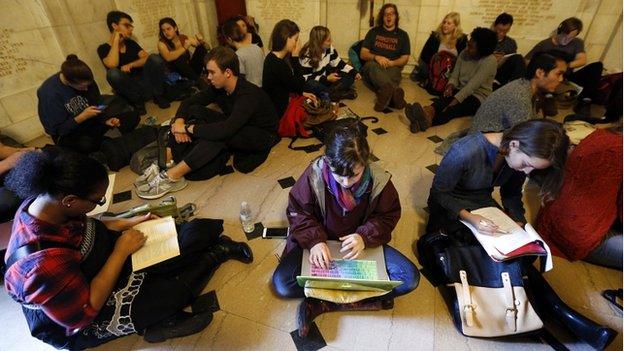
A sit-in at Princeton to change the name of a building named after Woodrow Wilson
"Race is so traumatic and central an issue in American culture - with both the history of slavery and the genocide of Native Americans always present," says Dr Christ.
The sensitivity over race and discrimination was heightened by events such as the shooting of a young black man by a police officer in Ferguson, Missouri.
"That created a lot of activism on college campuses," Dr Christ says.
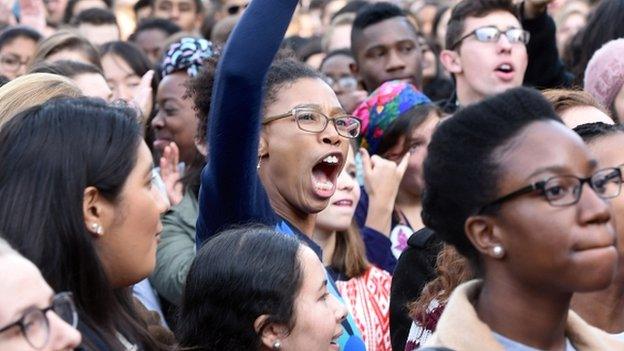
Protesters at Yale say they want to challenge racism on campus
And the arguments over emblems and traditions are part of a wider battle over identity and whose culture should be commemorated on campus.
"Colleges and universities in the United States make a huge amount of their history, they're always telling their story, it's the way in which they try and make almost a tribal identity," Dr Christ says.
But these stories might make difficult listening for minority groups, with the college names and emblems having echoes of slavery and segregation.
"They will feel an alienation from the stories that they're told to accept as part of their college identity," says Dr Christ.
Economic significance
What makes this an even more significant struggle is that university is now seen as the gateway to a better job.
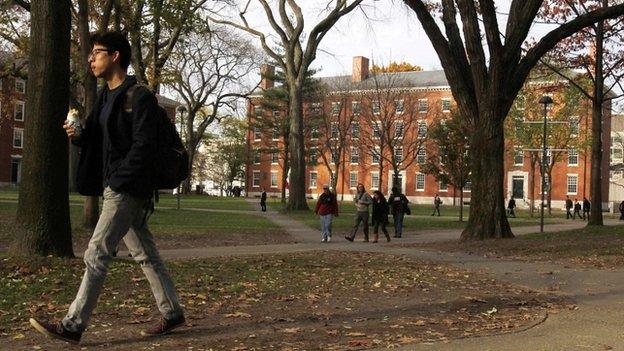
Harvard has faced protests about the academic title "master" and emblems with links to slavery
Even though universities might have a public commitment to inclusion and diversity, protesters have accused them of remaining the domain of a white middle and upper class.
Only about 5% of lecturers in US universities are black, according to official figures. Protesters have argued that universities have turned a blind eye to a long legacy of discrimination.
"It's about the increasing sense that college is the way to economic security and power in modern society," Dr Christ says, adding this is combined with fears prestigious colleges are increasingly being dominated by the wealthy.
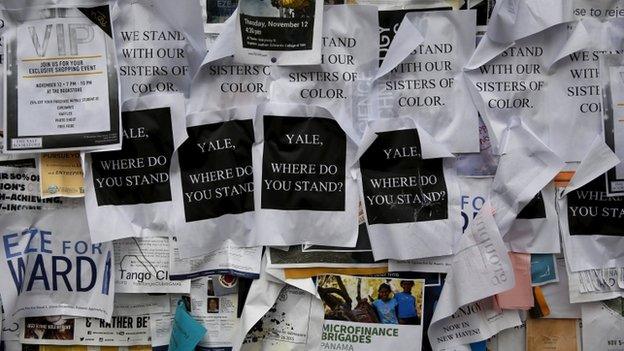
Yale has had disputes over the name of a building and "safe spaces"
Another provocative thread in the campus disputes has been about free speech and whether activities or language or opinions should be blocked if they upset some students.
This has included the concept of "safe space" where students can be protected from language or arguments that might offend them.
But this has been criticised by opponents as contradicting the intellectual purpose of a university, which should be about challenging ideas and contesting beliefs.
'Narcissistic'
Among the most forthright attacks came from Everett Piper, president of Oklahoma Wesleyan University.
Dr Piper told his students: "This is not a day care. This is a university."
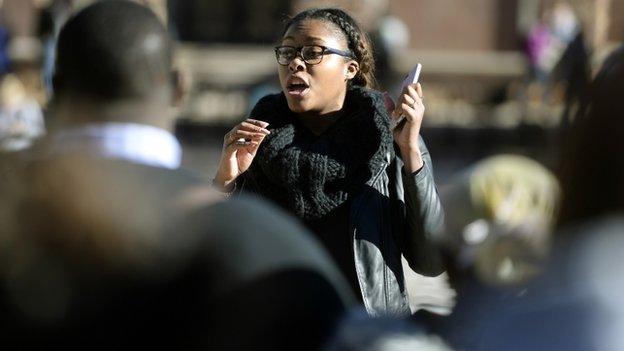
A Black Student Alliance protest at the University of Colorado
And he warned: "Our culture has actually taught our kids to be this self-absorbed and narcissistic. Any time their feelings are hurt, they are the victims.
"Anyone who dares challenge them and thus makes them feel bad about themselves, is a 'hater', a 'bigot', an 'oppressor' and a 'victimiser'."
There have also been arguments that changing the names of buildings is a way of avoiding uncomfortable questions about past attitudes, rather than addressing the historic legacy of universities.
But this simmering winter protest shows no sign of subsiding.
The president of the University of Missouri resigned last month, amid claims he had failed to respond adequately to allegations of racism.
And this week, a Yale lecturer, caught up in a row over the right to wear Halloween costumes, even if they caused offence, decided to step down from teaching.
Dr Christ says that "because race is so vexed and turbulent a subject" in the United States, the "controversies will continue".